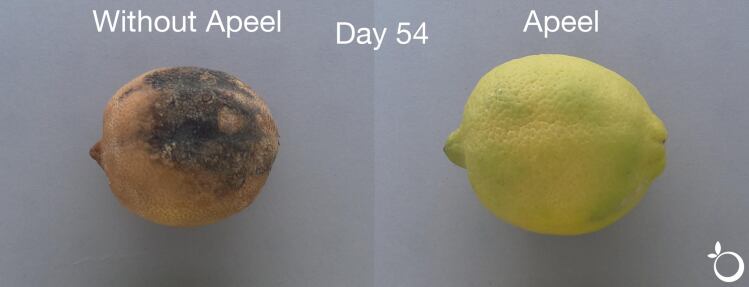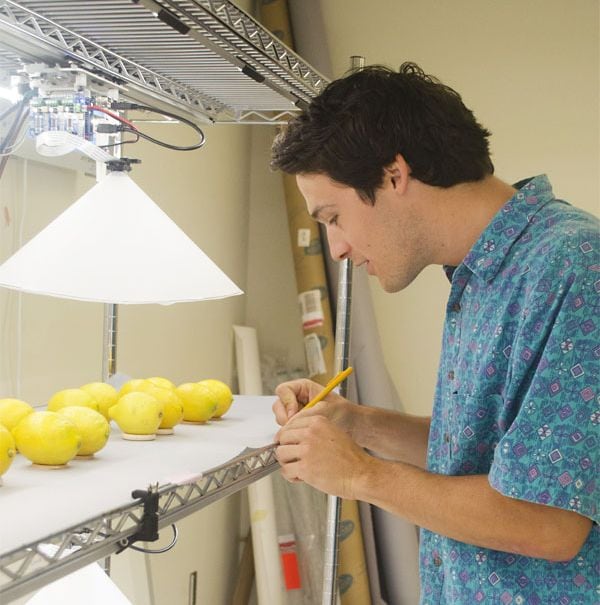Walter Robb, former co-CEO of Whole Foods Market, will also join its board of directors and advise the company, which was founded in 2012 by James Rogers, a materials scientist on a mission to create an “idealized little microclimate inside of each individual piece of produce,” via a semi-permeable barrier that modulates the rate at which water evaporates out and oxygen gets in.
Apeel (formerly known as 'Edipeel') is supplied as a powder that can be mixed with water and sprayed onto produce, or used as a dip, at packing facilities, and is now available in commercial quantities for avocados and citrus fruits, with multiple other applications to follow spanning everything from strawberries and bananas to mangos, green beans and asparagus.
Since Apeel avocados were introduced at Harps Food Stores in May, the company claims to have experienced a 65% increase in margin and a 10% increase in sales across the hass avocados category — primarily because it is not throwing as much product away.
The latest cash injection will help accelerate the company’s work across avocado, citrus, berry, stone fruit, and asparagus categories, said Apeel, which also plans to grow its team in Santa Barbara and establish satellite facilities to service partners in other parts of the US.
“A great next generation entrepreneur has come along using food itself to naturally extend the life of food, heralding a new era of possibility and promise,” said Walter Robb. “James and the team at Apeel Sciences are amazing and I am truly excited to be part of their efforts.”
"As Apeel products continue to hit the shelves, the retail world is now beginning to experience what was clear from day one, which is that Apeel is a product with the potential to change the world," said Yves Sisteron, founder and managing partner of Upfront Ventures, which first invested in Apeel Sciences in 2014.
Time to ditch the wax?
The funding was announced as Eco Farms, which has been working with Apeel on avocados, and has just started applying it to citrus, said the technology could organic citrus growers access overseas markets previously out of reach due to shelf-life limitations.
While conventional citrus fruits are often treated with wax containing a fungicide to prevent decay, the shipping radius of organic citrus is much more limited as firms are not allowed to use the fungicide in question, said Eco Farms CEO Andy Hamilton.
“Apeel’s coating brings exports into the equation, which has not been a consideration for us up until now… Some customers in the UK have already expressed interest in receiving California-grown organic citrus and this technology will be able to take us into new markets.
“In addition to export opportunities, I see some real potential advantages for retailers,” added Hamilton, who noted that most citrus is sold by weight, so retailers stand to gain from juicier, weightier lemons and oranges that have not lost so much moisture.
The invisible coating - which Apeel Sciences is testing on lemons, limes, oranges, grapefruit and other citrus varieties with multiple partners at a pilot level – “reduces the amount of water loss in citrus by up to 67%,” claimed VP strategy, Jordan Hudson. “In addition, it reduces the amount of shrinkage by up to 70%.”

Once you achieve an average of about a 4X extension in shelf life, you could completely replace the use of the cold chain
According to founder James Rogers, if you can quadruple the shelf-life of fresh produce, you could potentially eliminate the use of preservatives, controlled atmosphere, fungicides and potentially even refrigerated transport, altogether.
Speaking to FoodNavigator-USA earlier this year, he said: “The key metric is that once you achieve an average of about a 4X extension in shelf life, you could completely replace the use of the cold chain.”
Most people don’t think about this, he explained during a recent tour of his facility with FoodNavigator-USA, “but produce is a living, breathing thing, even after it’s picked. The trick is to maintain as much moisture as possible and maintain a very delicate balance between the rate of oxygen getting in and the rate of carbon dioxide getting out.
“If you cut down the oxygen too much, the fruit won’t develop appropriately and it will develop off flavors, and if you don’t cut down the oxygen enough, you’ll have no impact,” said Rogers, who secured a letter of no objection from the FDA to his GRAS determination for Apeel last year, and is now producing commercial quantities for citrus and avocados, with multiple other applications to follow spanning everything from strawberries and bananas to mangos, green beans and asparagus.
Colorless, odorless, tasteless
So what’s in Apeel?
“By limiting ourselves to materials that are extracted from plants [typically Apeel uses agricultural by-products such as tomato skins and seeds, where the source material is consistent], we select the appropriate combinations such that when we mix them up in water and they dry, they self-assemble into structures [an edible ‘skin’ of consistent thickness] that allow us to independently modulate the rate of oxygen and carbon dioxide transmission to create this optimized microclimate,” said Rogers, who described the composition as “predominantly lipid-based.”
This does not, however, make it waxy or greasy.
Indeed, the primary attraction to retailers is that Apeel is both ‘all-natural’ and invisible: it’s colorless, odorless, tasteless and undetectable on produce (no sticky or waxy residue), said Rogers. “You can’t see it, smell it, taste it, or feel it. And it’s just plants. We use food to preserve food.”
Apeel Sciences has raised $40m to-date from partners including Andreessen Horowitz, DBL Partners, BMGF, Upfront Ventures, S2G, and Powerplant Ventures. Additionally, Apeel has received grants from The Bill & Melinda Gates Foundation and The Rockefeller Foundation for post-harvest loss reduction programs in Sub-Saharan Africa.

Perhaps the most effective tool to demonstrate what Apeel does is what employees refer to as 'The Time Machine,' whereby Apeel lines up treated and untreated produce side by side, films what happens over a period of days or weeks, and then creates a time-lapse video, so viewers can see exactly how the samples compare at day 3, 6, 10, 20 and so on.
While time-lapse photography/film is not new, Apeel's Time Machine also records and analyzes data about color, texture, size and volume, and feeds this back into its computer systems to inform the development process, so is not just something fun to show potential customers as part of the sales pitch.
